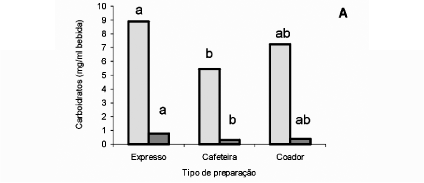Coffee is highly consumed worldwide and therefore one of the best studied beverages regarding chemical composition. Most of the soluble solids in coffee are carbohydrates, derived from the storage polysaccharides present in the seed of Coffea spp., with Coffea arabica being regarded the best quality beverage. In this work we studied the sugar composition, from the quantitative and qualitative viewpoints, of arabica coffee prepared by the three most common procedures in Brazil: i) boiling in water followed by filtering through cheese cloth; ii) filtered through paper filter in an electric coffee machine and iii) expresso. We found that the expresso procedure extracts relatively more soluble solids from coffee powder. However, it is also the procedure that produces the lowest molecular weight polymers, probably due to degradation associated to the high pressure used during its preparation. In contrast, boiled water and electric machine extracted much less (50%) soluble solids and produced much higher molecular weight polymers (ca. 3 times the MW of expresso). These differences can be explained by a higher degradation in expresso procedure in relation to the others. The difference in the quality of fibres produced is highlighted and the importance of these polymers as food fibre is discussed.
Coffea arabica; polysaccharides; HPAEC









